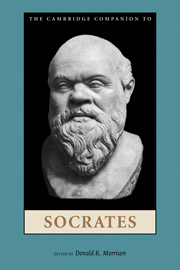Book contents
- Frontmatter
- 1 The Rise and Fall of the Socratic Problem
- 2 The Students of Socrates
- 3 Xenophon and the Enviable Life of Socrates
- 4 Socrates in Aristophanes’ Clouds
- 5 Socrates and the New Learning
- 6 Socratic Religion
- 7 Socrates and Democratic Athens
- 8 Socratic Method
- 9 Self-Examination
- 10 Socratic Ignorance
- 11 Reconsidering Socratic Irony
- 12 Socratic Ethics and the Socratic Psychology of Action
- 13 Socrates and Eudaimonia
- 14 Socrates’ Political Philosophy
- 15 Socrates in Later Greek Philosophy
- Socrates Bibliography
- Index of Names and Subjects
- Index of Passages
2 - The Students of Socrates
Published online by Cambridge University Press: 28 March 2011
- Frontmatter
- 1 The Rise and Fall of the Socratic Problem
- 2 The Students of Socrates
- 3 Xenophon and the Enviable Life of Socrates
- 4 Socrates in Aristophanes’ Clouds
- 5 Socrates and the New Learning
- 6 Socratic Religion
- 7 Socrates and Democratic Athens
- 8 Socratic Method
- 9 Self-Examination
- 10 Socratic Ignorance
- 11 Reconsidering Socratic Irony
- 12 Socratic Ethics and the Socratic Psychology of Action
- 13 Socrates and Eudaimonia
- 14 Socrates’ Political Philosophy
- 15 Socrates in Later Greek Philosophy
- Socrates Bibliography
- Index of Names and Subjects
- Index of Passages
Summary
INTRODUCTION
At the end of the Socrates chapter in his Lives of Eminent Philosophers, Diogenes Laertius asserts that out of all the friends and students of Socrates, seven have to be regarded as the most important ones. These are the four Athenians – Antisthenes, Aeschines, Plato, and Xenophon – as well as Euclides from Megara (who must not be confused with the well-known mathematician with the same name, who lived in Alexandria about 100 years later), Aristippus from Cyrene, and Phaedo from Elis. All seven wrote books, but only Plato’s and Xenophon’s are still preserved. Thus, when we talk about the Socratics, we have Plato and Xenophon primarily in mind. The other five were students of Socrates, as much as Plato and Xenophon were. So their writings, if they had been preserved, would stand on an equal footing with those of Plato and Xenophon, and would deserve the same attention as representations of the influence of their common teacher, Socrates. Since these writings have been lost, their place will have to be taken by what can be learned from the texts of various other authors who referred to their writings and doctrines. How much this broadens the spectrum of Socrates’ influence is clear from the very different views that Antisthenes, Aristippus, and Plato hold on the issue of pleasure (hêdonê).
- Type
- Chapter
- Information
- The Cambridge Companion to Socrates , pp. 24 - 47Publisher: Cambridge University PressPrint publication year: 2010
- 6
- Cited by

